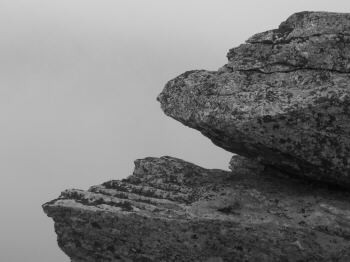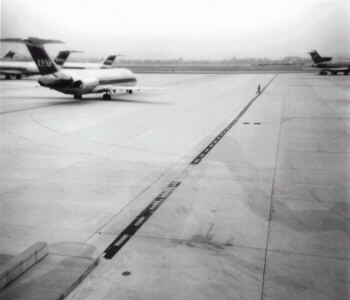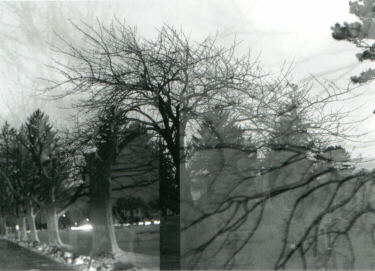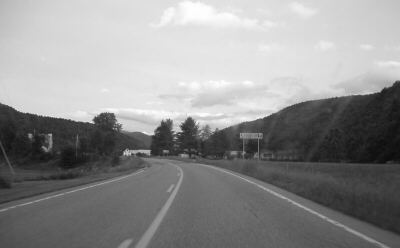This is about what always is and what only sometimes is.
This is about the paradox that sadness and joy are the same.
This is not a parable.
*
Sometimes a crumb falls from the tables of joy Sometimes a bone is flung. To some people love is given, To others, only heaven. Langston Hughes

*
When Jacob the Patriarch awakens from his dream, he says "God was in this place — and I, I did not know." In Jacob’s stuttering realization lies the true secret, not the one advertised on television but the one which awakens hearts: that for all our doubting of the existence of God, God is here and we are not.
Jacob does not say that God suddenly showed up. Rather, God — It, What I Want, This, The Point, Enlightenment, The Good, The One; all of those many synonyms for whatever we think we can designate as holy, worthwhile, or sacred — was always there. Where were we? Complaining, or paying the bills.
Always there — not sometimes there. That is to say, contemplative practice is not about ontology. Ontologically, we’re always It, always God, always swimming in the infinite. But epistemologically, psychologically, emotionally — we don’t know it. This is why the Jewish language for mystical union is made up of gerunds: devekut, sticking to God like glue; achdut, unification. States of being which do not change being, but change our relationship to it.
At the beginning of the spiritual path, the purpose of practice is to cultivate more of these states; more devekut, more hitlahavut (fiery ecstasy), more hitbonnenut (quiet contemplation). In so doing, it is possible to spend more time in an expanded mind (mochin d’gadlut) and less in the contracted one (mochin d’katnut).
Gradually, however, this path becomes a cul-de-sac. It is impossible to always keep getting higher, and even if it were possible, it is, in the Jewish tradition at least, irresponsible. Not only are their mouths to feed and promises to keep, there are injustices to mend and suffering to ease. There are families, responsibilities, and expressions of the soul; friends and communities; obligations and delights. Is all of human life to be aligned with a single axis of value, with one form of devekut the only goal worth pursuing?
As that question comes to be answered in the negative, a further stage of the spiritual path is required — one in which the peak experience is replaced with the awareness that was once present only during the peak experience being extended to ever-greater spheres of our experience. This is the psychological extension of the ein sof, the Infinite, which comes to reflect the ontological reality of infinitude itself: that now, both the laundry and the ecstasy are holy.
And "holiness" itself changes its character. At first, "holy" meant connected times, beautiful times, blissful times; now it means anytime. Even "good" begins to shift from its conventional meaning into a panentheistic reality in which even that which is deeply satisfying is, in some non-moral and non-communicative way, deeply tov, good. Now contemplative practice ceases to be about a certain kind of peak, wonderful, joyous, experience, and becomes about the transformation of any kind of experience into one of holiness, or at least of worthiness.
Easy when you’re reading a little essay. Hard when you’re doubled over in pain, or mourning, or just going to the bathroom. Is this moment worthy? This one? This one? Clearly, "worthy" cannot mean "okay" or "it’s all God’s will." Concepts mar the simplicity of what is.
But what about the times at which our illusory wills and selfish interests seem to us to be the entirety of life’s meaning? Are we, at these times, totally lost? What about the times when we have suffered a loss, and feel we cannot recover — when, no matter how many lovely poems we read about God or enlightenment, no matter how many trite self-help books we have digested, we still feel sad?
*
One should note that Joseph often cried. In fact there are no less that eight references in the Torah to him doing so. One who has suffered greatly in bad times will cry easily even in good times. The brothers, on the other hand, who had not suffered in their lives, did not even cry when the situation demanded that they should. And as Joseph even cried at the distress of others, he was worthy of attaining his high rank.
Rabbi Zalman Sorotzkin (1881-1966) in Oznayim La-Torah
*
The Jewish morning prayer service begins with the words of a non-Jewish prophet, Balaam, who had been sent to curse the Israelites by a foreign king. The Torah tells that on his journey to curse Israel, Balaam had been blind to the reality of God’s presence. Even his donkey had seen that angels were accompanying them (and blocking their way), but Balaam was on an errand. Maybe you know this feeling, when you’re so busy rushing and worrying and planning that you do not see what is around you. I certainly do.
 After a series of extraordinary events, Balaam finally does open his eyes, and by the time he arrives at the Israelite camp, he is filled with insight. Instead of a curse, he says: mah tovu ohalecha ya’akov, mishkenotecha yisrael. Which means: how good are your tents, Jacob; your dwelling places, Israel.
After a series of extraordinary events, Balaam finally does open his eyes, and by the time he arrives at the Israelite camp, he is filled with insight. Instead of a curse, he says: mah tovu ohalecha ya’akov, mishkenotecha yisrael. Which means: how good are your tents, Jacob; your dwelling places, Israel.
The sentence is really a parallel construction of two clauses: one about the tents of Jacob, the other about the dwelling places of Israel. Come and see: Jacob’s first act was to grasp the ankle of his twin brother, Esau, as they came out of the womb. As a boy, he lived in the shadow of his older, stronger brother, and he schemed to obtain Esau’s blessing and birthright. Jacob is the grasper, the small-mind, the part that hurts and yearns and cheats and steals — all of that shadow. He lives in a closed tent.
Dwelling places of Israel, on the other hand — that is the place of expansion. Mishkan is the word for the Divine altar. Don’t we all want that — to be godwrestlers, or the builders of places in which the Indwelling Presence of Divinity can abide? Surely the point is to be more like Israel and less like Jacob — right?
Not the way the text is written. Balaam does not say that only Israel’s dwelling places are good. Nor does he say how great it is when our finite tents are transformed into places for the Infinite. Rather, both sides are tov, good.
We are here, with bodies, with hearts, minds, and souls. We cry when we are hurt and laugh when we are joyful. This is tov — Good. It is tov when we make our lives into dwelling places for holiness, and it is also tov when we are suffering.
And not merely "good." According to the Zohar, the masterwork of the Kabbalah, the word Mah, which ordinarily means ‘what’ or ‘how,’ is a signifier of the Shechinah, the Divine Presence Herself. So when Balaam says mah tovu, he isn’t just saying AHow good are your tents…" he is saying AHow God are your tents…"
In other words, that ultimate Goodness, the Presence of God, however you understand what it is you most want to be — it inheres both in times of Israel, when we feel expanded and wonderful, and times of Jacob, when we don’t. Devekut, merging with God, is all-inclusive.
Logically, this is obviously the case.
If God is everywhere and fills all of creation, God is right here, now, in your mind and outside your mind, in fact there is no inside or outside, no separate self or separate anything, and this moment is arising only within primordial Awareness.
It’s not that your personal tents of Jacob, your constricted places are Aokay" because they are part of life. Those places are God in that moment.
Put simply, “This Is It." This moment, even if it is flavored with sadness, is It — the Big It, God, the Friend, Enlightenment, the Now, Being, Awareness. There are no bells and whistles to announce God’s Presence: only the opened mind of the one who is present with It.
When we cry, when we feel isolated, when we encounter loneliness or pain — that is God in the guise of crying, or isolation. There is no inside or outside to God; the One Being is what is around you right now, and what is inside you. Thus the gate of sadness teaches that all of our soul is purely God, even those parts which our egos regret or despise.
*
Lama Surya Das says: “The only thing that keeps us from happiness is searching for it."
Does that seem like a “paradox” to you? It is not a paradox.
*
====
 Another way of saying it.
Another way of saying it.
Psalm 150 teaches that kol haneshama tehallel yah. This may mean one of two things. Either it means that "every soul shall praise Yah" or it means that "the whole soul shall praise Yah." Both interpretations have merit. On the one hand, every person has the opportunity to make his or her life an inchoate praise of the One. And on the other: the whole soul; all of it. So there is no part of any soul that does not, as it is and with what we perceive it to be its flaws, praise God.
These are more spiritual words that sound pleasant and inoffensive until their consequences are seriously considered. Every person — murderers and rapists as well? Personally, I find the mundane at least as difficult to reconcile as the terrible — co-workers and family members, because they are present in my life, are more challenging than abstract evildoers like Hitler or Stalin, who, thank God, are not. Are all these "difficult people," from the ridiculous to the sublime, to be included in kol haneshama? And what about those parts of myself which throw tantrums, are consumed by anger, and speak hateful words?
To enter the gate of sadness is to begin to glimpse the audacity, even the absurdity, of the spiritual path itself. Yes– yes– yes– Being is What It Is, regardless of how annoying or hateful I find it to be. My ego is not the arbitrator of all that matters in the world. In fact, that supposed arbitrator is precisely that which must be broken for the heart to be allowed to open. All of us believe that the self has needs and wants, and all of us try to advance those wants. But our success in meeting these desires is not equivalent with how much we are praising God.
Sadness is not an expression of the heart to be discarded in favor of those which are better. To believe that everything happens as it must is not to be fatalistic and cowed; it is not to believe everything happens for the best; it is to understand that sadness is part of the unfolding of the God Process. Praise God with it. Even that which is not, apparently, for our best may be turned to an instrument of praise. Not by denying its painfulness, but by deeply seeing this soul, in this body, at this moment, as manifesting the unfolding of the One. The pain is real, and it is God.
*
"There is nothing so whole as a broken heart," wrote the Kotsker rebbe, who would know. The Jewish path is one of love and tears and fear and doubt. The broken heart is God’s heart breaking.
This is a path of love — love, not edification or ethical refinement; embarrassing, naked, private love. The miracle of God is the miracle of love — and yet, human and Divine love are not entirely congruent. The Divine love of God is always present, even when it is in eclipse, and even when our souls feel cut off from their Source. But the ability to change is a fundamental aspect of human nature. So we cannot have the confidence in human love that we have with the Divine.
If we take earthly love for granted, it may disappear. If we neglect our loved ones, and do not express our own love in words and actions, they may cease to love us. Likewise, if we smother one another with affection, and do not provide room for independence and growth — in this case, too, love can vanish.
 The Jewish path projects these aspects of human love onto the Divine. Jewish mystics write rapturous love poems to the One, mapping the world of human love onto the Divine — giving voice to the longing, the consummation, and the longing anew. Yet there is a difference. When we are certain of our human lover’s affection, we risk taking him or her for granted. When we are certain of God’s love, we begin the journey to da’at, knowledge of Unity.
The Jewish path projects these aspects of human love onto the Divine. Jewish mystics write rapturous love poems to the One, mapping the world of human love onto the Divine — giving voice to the longing, the consummation, and the longing anew. Yet there is a difference. When we are certain of our human lover’s affection, we risk taking him or her for granted. When we are certain of God’s love, we begin the journey to da’at, knowledge of Unity.
*
Hinei el yeshuati, eftach v’lo efchad — Behold, God is my salvation, I will trust and not fear. These words from the Book of Psalms are recited as part of the Havdalah service, which separates the holy time of Shabbat from the ordinary time of the rest of the week. Of course, we know that all time is holy, as is all space, but we humans need these boundaries of distinction (kedushah) in order to prepare ourselves to receive it. Even though God is here, now, sometimes you are not.
The darkness is, from our point of view, real.
When we move from a time of sanctuary, abiding in the spaciousness of the shechinah, into a time of necessary constriction into our ego-selves, it is natural to fear. In the Presence, everything is good. In the world conditioned by our yetzer, things require our attention. We are dissatisfied, working to improve things, and thus necessarily thrown into a place of pain and loneliness.
So the liturgy tells us to not be afraid. I read it not as promising that pain will be kept at bay — King David, the legendary author of the psalms, knew that it will not. Pain will happen. But God will be with you wherever you are, even in the pain.
Sometimes when we are presented with something delightful, anxiety can rise as we contemplate the certainty that it will eventually be taken from us. We worry: will he remain in love with me? How long until my body succumbs to illness? When will my luck run out? And so we cannot enjoy joy; and so we help speed its end by clinging, fearing, worrying, over-analyzing.
If we trust that God is present even in our painful mind-states, that we will be Asaved" from suffering by abiding in mochin d’gadlut, regardless of what comes our way, then we can be free from fear. Come what may, it will always be Now, and I will always be Here.
Hinei means "behold" but also “Here." Here is God, my salvation. And here, and here, and here.
And here.








Your web site won’t display appropriately on my blackberry – you may want to try and repair that
when it comes to tv fashion shows, i really love Project Runway because it shows some new talents in the fashion industry“
I am forever thought about this, thank you for posting.
i love to receive birthday cards specially if they are custom built birthday cards**